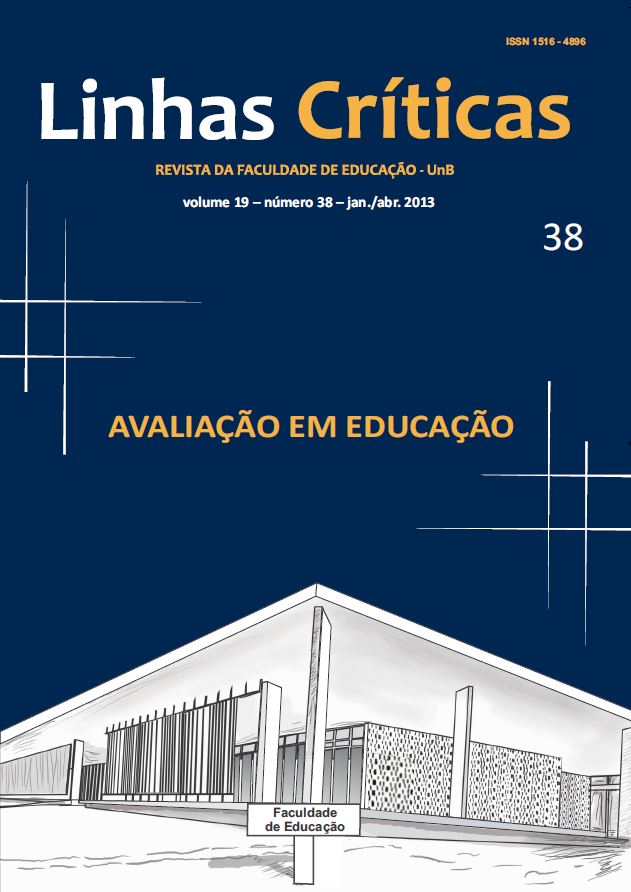On opening up to babies’ and young children’s points of view and the power of their wishes
DOI:
https://doi.org/10.26512/lc.v19i38.4097Keywords:
Babies, Young children, Power of wishesAbstract
This article links empirical and theoretical elements derived from study, research and community outreach experiences, involving babies, young children, teachers and teaching assistants. The theoretical background is sustained by references from early childhood education and childhood sociology, especially from post-structuralist philosophical conceptions, based on the studies of Mozère (2007). Knowledge about care and education is systematized and indicates conceptual and methodological clues for the organization of pedagogical practices in teachers’ education, which aim at the riveting movement of opening oneself to the points of view and the power of the wishes of babies and young children.
Downloads
References
BEYER, Esther. A importância da interação no desenvolvimento cognitivo musical: um estudo com bebês de 0 a 24 meses. Anais do SIMCAM4 ”“ IV Simpósio de Cognição e Artes Musicais, maio de 2008.
BORDO, Susan. O corpo e a reprodução da feminidade: uma apropriação feminista de Foucault. In: JAGGAR, Alison ; BORDO, Susan. Gênero, Corpo, Conhecimento. Rio de Janeiro: Rosa dos Tempos, 1997. p.19-41.
BRASIL. Ministério da Educação. Práticas Cotidianas na Educação Infantil: Bases para a Reflexão sobre as Orientações Curriculares. Brasília: MEC, 2009.
BROUGÈRE, Gilles; VANDENBROECK, Michel. Pourquoi de nouveaux paradigmes? In: BROUGÈRE, Gilles; VANDENBROECK, Michel (Dir.). Repenser l’ éducation des jeunes enfants. Bruxelles: Éditions Scientifiques Internationales, 2007. p. 9 -19.
DAHLBERG, Gunilla; MOSS, Peter. Au - dela de la qualité, vers l’éthique et la politique em matière d’éducation préscolaire. In: BROUGÈRE, Gilles; VANDENBROECK, Michel (dir.). Repenser l’ éducation des jeunes enfants. Bruxelles: Éditions Scientifiques Internationales, 2007. p. 53 -76.
DELEUZE, Gilles; GUATTARI, Félix. Mille plateaux. Capitalisme et schizophrenie. Paris: Éditions de Minuit, 1980.
DELEUZE, Gilles. Mil Platôs: Capitalismo e esquizofrenia. São Paulo: Ed. 34, 1997. v. IV.
DOLTO, Francoise. La cause des enfants. Paris: Éditions Robert Laffont, 1985.
FALCADE, Noeli. ASQUAGARU. Programa de Saúde com mulheres e crianças indígenas Kaingangs. In: TREIN, Hans (Org.) Relatório Institucional do Comin 2010. São Leopoldo: COMIN, 2010. (Digitalizado).
FALK, Judit. Educar os três primeiros anos: a experiência de Lóczi. São Paulo: Junqueira & Marin, 2010.
FOUCAULT, Michel. Surveiller et punir, Gallimard, 1975.GOMES, Denise Barata. Caminhando com arte na pré-escola. In: GARCIA, Regina Leite (Org.). Revisitando a pré-escola. São Paulo: Cortez, 1993. p. 123 -141.
GOTTLIEB, Alma. Para onde foram os bebês? Em busca de uma antropologia de bebês (e de seus cuidadores). Psicologia USP, São Paulo, USP, v. 20, n. 3, p. 313-336, jul-set. 2009.
GUATTARI, Félix. As creches e a iniciação. In: GUATTARI, Félix. Revolução Molecular: pulsações políticas do desejo. São Paulo: Brasiliense, 1987. p. 50”“55.
GUATTARI, Félix. ; ROLNIK, Sueli. Micropolitiques. Paris: Les empêcheurs de penser en rond, 2007.
GUIMARÃES, Daniela. Técnicas corporais, cuidado de si e cuidado do outro nas rotinas com bebês. In: ROCHA, Eloisa; KRAMER, Sonia (Orgs.). Educação Infantil. Enfoques em diálogo. Campinas: Papirus, 2011.
KOHAN, Walter (Org.). A infância da educação: o conceito devir-criança. In:______. (Org.). Lugares da infância: filosofia. Rio de Janeiro: DP&A, 2004. p. 51-68.
LEAL, Bernardina. Leituras da infância na poesia de Manoel de Barros. In: KOHAN, Walter (Org.). Lugares da infância: filosofia. Rio de Janeiro: DP&A, 2004. p. 19”“30.
MACHADO, Maria Lucia Alcantara. Pré-escola não é escola. A busca de um caminho. São Paulo: Editora Paz e Terra, 1991.
MONTAGU, Ashley. Tocar. O significado humano da pele. 6ed. São Paulo: Summus, 1988.
MOZÈRE, Liane. “Du côté” des jeunes enfants ou comment appréhender le désir en sociologie? In: BROUGÈRE, Gilles; VANDENBROECK, Michel (Dir.). Repenser l’ éducation des jeunes enfants. Bruxelles: Éditions Scientifiques Internationales, 2007. p. 165 ”“ 188.
OSBORNE, Kate. El trabajo de las mujeres...nunca termina. In: FIRTH-COZENS, Jenny & WEST, Michael A. (Org.). La mujer en el mundo del trabajo. Madrid: Morata, 1991. p. 15-26.
RICHTER, Sandra Regina Simonis; BARBOSA, Maria Carmen Silveira. Os bebês interrogam o currículo: as múltiplas linguagens na creche. Educação, Santa Maria, UFSM, v. 35, n. 1, p. 85-96, jan-abr. 2010.
SARMENTO, Manuel Jacinto. As Culturas da Infância nas Encruzilhadas da Segunda Modernidade. In: SARMENTO, Manuel; CERISARA, Ana Beatriz. Crianças e Miúdos: perspectivas sociopedagógicas da infância e educação. Porto, Portugal, Asa Editores, 2004. p. 9-34.
SERRES, Michel. Hominescências. O começo de uma outra humanidade? Rio de Janeiro: Bertrand do Brasil, 2003.
SHORE, Rima. Repensando o cérebro: novas visões sobre o desenvolvimento inicial do cérebro. Porto Alegre: Mercado Aberto, 2000.
SIMON, Claire; DELALANDE, Julie. Enfants Scénaristes, enfants acteurs sociaux: Rencontre de deux regards sur la cour de récréation. Revue Les Sciences de l’éducation. Pour l’ère nouvelle. Revue internationale. Territoire des enfants. Revue/França, v. 39, n.2, p. 89-102, mai, 2006. (Numéro thématique coordonné par Julie Delalande).
WINNICOTT, Donald W. Os bebês e suas mães. 3ed. São Paulo: Martins Fontes, 2006.
Downloads
Published
How to Cite
Issue
Section
License
Copyright (c) 2016 Linhas Críticas

This work is licensed under a Creative Commons Attribution 4.0 International License.
Authors who publish in this journal agree to the following terms:
-Authors maintains the copyright and grants the journal the right of first publication, the work being simultaneously licensed under the Creative Commons Attribution License which allows the sharing of the work with recognition of the authorship of the work and initial publication in this journal.
- Authors are authorized to enter into additional contracts separately, for non-exclusive distribution of the version of the work published in this journal (eg publish in institutional repository or as a book chapter), with acknowledgment of authorship and initial publication in this journal.
-Authorers are allowed and encouraged to publish and distribute their work online (eg in institutional repositories or on their personal page) at any point before or during the editorial process, as this can generate productive changes as well as increase the impact and the citation of published work (See The Effect of Free Access).



